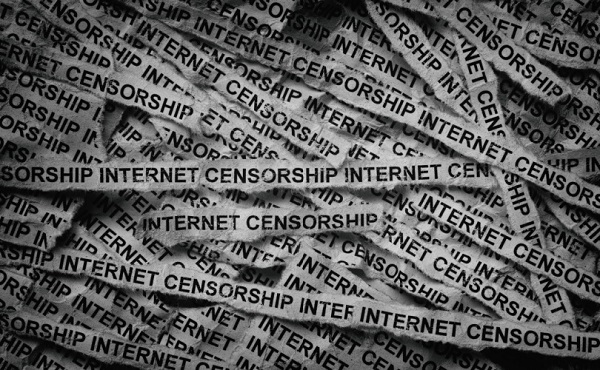Censorship Industrial Complex
Canadian gov’t claims privacy provision in online censorship bill was “accidentally” removed

From LifeSiteNews
The government apparently ‘deleted privacy safeguards that were included in the bill only two months after they were enacted,’ a law professor said.
The Liberal government of Canadian Prime Minister Mark Carney confirmed that a privacy provision in the Trudeau-era Online Streaming Act law, which aims to censor legal internet content in Canada, may have been accidentally removed.
According to reports, the federal government is now “looking into” what happened to the privacy provision for Bill C-11, also known as the Online Streaming Act, that became law in 2023.
Last week, Michael Geist, a University of Ottawa law professor who has long been critical of former Prime Minister Justin Trudeau’s numerous internet censorship laws, noted that the privacy provision was removed two months after Bill C-11 became law. This was accomplished through an amendment to another bill.
According to Geist, in his August 25 blog, due to what is “likely a legislative error,” the federal government “deleted privacy safeguards that were included in the bill only two months after they were enacted.”
“As a result, a provision stating that the Broadcasting Act ‘shall be construed and applied in a manner that is consistent with the right to privacy of individuals’ was removed from the bill, leaving in its place two nearly identical provisions related to official languages.”
Geist noted that the Broadcasting Act has, for the past two years, “included an interpretation clause that makes no sense, and efforts to include privacy within it are gone.”
Canada’s Department of Heritage says it knows about the privacy omission, as it has been “recently been made aware of what appears to be an inadvertent oversight in a coordinating amendment and is looking into it,” a spokesperson noted in a statement to media.
Bill C-11 mandates that Big Tech companies pay to publish Canadian content on their platforms. As a result, Meta, the parent company of Facebook and Instagram, blocked all access to news content in Canada. Google has promised to do the same rather than pay the fees laid out in the new legislation.
The bill was already supposed to have been implemented by the Canadian Radio-television and Telecommunications Commission (CRTC), the country’s broadcast regulator that is tasked with putting in place the law.
However, the CRTC said it will not be until late 2025 that it will finally have a framework to determine exactly how much streaming services will be forced to pay to be in line with mandates for more Indigenous and Canadian content.
Senator not happy with mistake
Digging deeper, it appears that during Bill C-11’s legislative process, Canadian Senator Julie Miville-Dechêne put forth an amendment, based on advice from Canada’s federal privacy commissioner, that the bill contain privacy protections. This then became part of Bill C-11, or the Online Streaming Act, which stated that it would be made so that it respects a person’s privacy.
Miville-Dechêne was not happy with the mistake, noting, “I’m a bit surprised, because I thought there were many levels of verification … But, you know, mistakes happen. I think now the question is that it has to be corrected quickly.”
Trudeau’s Online Streaming Act became law in April 2023, with the privacy protections included. However, this only lasted for two months, as the federal government went ahead with Bill C-13, which, as noted by Geist, had “buried at the end of the bill” a change to the “Broadcasting Act that few seemed to notice.”
A part of Bill C-13 amended the Online Streaming Act to alter language in a provision about official languages for so-called minority communities. This meant that, in effect, Bill C-13 replaced the privacy protections.
“Somehow, no one noticed the change or worked through the implications of the provision (unless, more troublingly, this was the government’s attempt to undo the privacy change). As a result, when both bills received royal assent, the privacy provision in the Broadcasting Act was replaced by a second provision on official languages,” Geist said.
“The Broadcasting Act’s interpretation clause now includes two very similar provisions on official language minorities and no provision on protecting privacy. One would hope that this was not the intent, but the government was always too focused on the political side of Bill C-11 and did not pay enough attention to the specific implications of the legislation.”
The government has claimed that despite the apparent mistake the public and private-sector privacy laws still apply.
Censorship Industrial Complex
Conservative MP calls on religious leaders to oppose Liberal plan to criminalize quoting Scripture

From LifeSiteNews
Quoting the Bible, Quran, or Torah to condemn abortion, homosexuality, or LGBT propaganda could be considered criminal activity
Conservatives are warning that Canadians should be “very afraid” of the Liberals’ proposal to punish quoting Scripture, while advising religious leaders to voice their opposition to the legislation.
During a December 6 session in Parliament, Conservative Member of Parliament (MP) Larry Brock warned Canadians of the very real threat to their religious freedom thanks to proposed amendments to Bill C-9, the “Combating Hate Act,” that would allow priests quoting Scripture to be punished.
“Do Christians need to be concerned about this legislation?” MP Bob Zimmer questioned. “Does it really threaten the Bible and free speech in Canada?”
“They should be very afraid,” Brock responded. “Every faith leader should be very afraid as to what this Liberal government with the support of the Bloc Quebecois wishes to do.”
“As I indicated, religious freedom is under attack at the hands of this Liberal government,” he declared.
Brock stressed the need for religious leaders to “speak out loud and clear” against the proposed amendment and contact their local Liberal and Bloc MPs.
Already, the Canadian Conference of Catholic Bishops penned an open letter to the Carney Liberals, condemning the proposed amendment and calling for its removal.
As LifeSiteNews reported earlier this week, inside government sources revealed that Liberals agreed to remove religious exemptions from Canada’s hate speech laws as part of a deal with the Bloc Québécois to keep Liberals in power.
Bill C-9, as reported by LifeSiteNews, has been blasted by constitutional experts as empowering police and the government to go after those it deems to have violated a person’s “feelings” in a “hateful” way.
Now, the Bloc amendment seeks to further restrict free speech. The amendment would remove the “religious exemption” defense, which has historically protected individuals from conviction for willful promotion of hatred if the statements were made “in good faith” and based on a “religious subject” or a “sincerely held” interpretation of religious texts such as passages from the Bible, Quran, or Torah.
As a result, quoting the Bible, Quran, or Torah to condemn abortion, homosexuality, or LGBT propaganda could be considered criminal activity.
Shortly after the proposed amendment was shared on social media, Conservatives launched a petition, calling “on the Liberal government to protect religious freedom, uphold the right to read and share sacred texts, and prevent government overreach into matters of faith.”
Already, in October, Liberal MP Marc Miller said that certain passages of the Bible are “hateful” because of what it says about homosexuality and those who recite the passages should be jailed.
“Clearly there are situations in these texts where these statements are hateful,” Miller said. “They should not be used to invoke or be a defense, and there should perhaps be discretion for prosecutors to press charges.”
His comments were immediately blasted by Conservative politicians throughout Canada, with Alberta provincial Conservative MLA and Minister of Municipal Affairs Dan Williams saying, “I find it abhorrent when MPs sitting in Ottawa – or anyone in positions of power – use their voice to attack faith.”
Censorship Industrial Complex
Liberals gain support for ‘hate speech’ bill targeting Bible passages against homosexuality

From LifeSiteNews
The Bloc Québécois are now backing the hate-speech Bill C-9 in Canada after the Liberal government agreed to take away a religious exception.
A Liberal government bill to criminalize parts of the Bible dealing with homosexuality under Canada’s new “hate speech” laws looks closer to becoming reality after gaining the support of the Bloc Québécois party when a religious exception was removed.
The National Post reported that the Bloc Québécois are now backing the hate-speech Bill C-9 after the Liberal government of Prime Minister Mark Carney agreed to take away a religious exception.
Bill C-9, the Combating Hate Act, as reported by LifeSiteNews, has been blasted by constitutional experts as allowing empowered police and the government to go after those it deems to have violated a person’s “feelings” in a “hateful” way.
As reported by LifeSiteNews, a government insider revealed that the Liberal government plans to remove religious exemptions from Canada’s hate-speech laws by modifying a bill. This would affect passages of the Bible dealing with homosexuality.
A recent media report states that the Carney Liberals and the separatist Bloc Québécois want to amend Bill C-9, which would “criminalize sections of the Bible, Quran, Torah, and other sacred texts,” Conservative leader Pierre Poilievre noted yesterday on X.
Both the Liberals and the Bloc are on board to support the removal of a religious exemption in Canada’s Criminal Code for the bill.
On Monday, Canadian Justice Minister Sean Fraser was rather mum on the deal made with the Bloc, which now says the deal is on thin ice due to canceled justice committee meetings.
Fraser said that it is his “priority” to see “this bill adopted,” but admitted it will need the support of other parties.
“That’s going to require that we collaborate with different parties who have different points of view,” he said.
However, it appears that such meetings will take place this week, but Conservative Party MPs have promised to fight the removal of the religious exception.
Liberal MP Marc Miller had said earlier in the year that certain passages of the Bible are “hateful” because of what it says about homosexuality, and those who recite the passages should be jailed. As reported by LifeSiteNews, he was recently appointed as a government minister by Carney.
Canadian Conservative MP Leslyn Lewis blasted the Carney Liberals’ federal plan to criminalize parts of the Bible as an attack on “Christians,” warning it sets a “dangerous precedent” for Canadian society.
In response, the party launched a petition over fear that religious texts could be criminalized.
-

 Business2 days ago
Business2 days agoCanada Can Finally Profit From LNG If Ottawa Stops Dragging Its Feet
-

 Crime2 days ago
Crime2 days agoInside the Fortified Sinaloa-Linked Compound Canada Still Can’t Seize After 12 Years of Legal War
-

 Automotive17 hours ago
Automotive17 hours agoThe $50 Billion Question: EVs Never Delivered What Ottawa Promised
-

 National2 days ago
National2 days agoLiberal bill “targets Christians” by removing religious exemption in hate-speech law
-

 Energy2 days ago
Energy2 days agoLNG NOW! Canada must act fast to prosper in changing times
-

 Health1 day ago
Health1 day agoUS podcaster Glenn Beck extends a lifeline to a Saskatchewan woman waiting for MAiD
-

 Local Business14 hours ago
Local Business14 hours agoRed Deer Downtown Business Association to Wind Down Operations
-

 C2C Journal16 hours ago
C2C Journal16 hours agoWisdom of Our Elders: The Contempt for Memory in Canadian Indigenous Policy






